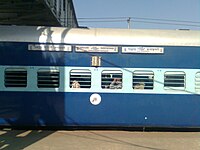Vivek Express
Vivek Express is a chain of express trains on the Indian Railways network. These trains were announced in the Railway Budget of 2011-12[1] by the then Railway Minister. These trains were started to commemorate the 150th birth anniversary of Swami Vivekananda, to be held in 2013. One of the Vivek Express trains, the one from Dibrugarh to Kanyakumari, is the longest route on the Indian Railways network, in terms of distance and time, and is currently the 24th longest in the world.[2]
List of Vivek Express TrainsEdit
As of July 2013, there are 4 pairs of Vivek Express trains
Dibrugarh - Kanyakumari Vivek ExpressEdit
This weekly train, numbered 15905/15906, is currently the longest train route in the Indian Subcontinent. It joins Dibrugarh in Assam, North-East India to Kanyakumari, Tamil Nadu which is the southernmost tip of Mainland India. It covers a total of 4234 km from Dibrugarh to Kanyakumari. It takes 79 hours to cover this distance with 57 intermediate stoppages.
Okha - Tuticorin Vivek ExpressEdit
This too, is a weekly train, numbered 19567/19568. It connects Okha, Gujarat (which is the westernmost tip of India) to Thoothukudi, the "Pearl City", in Tamil Nadu in South India. This train covers 3043 km in 54:25 hours. It travels through the states of Gujarat, Maharashtra, Andhra Pradesh, Karnataka and Tamil Nadu.
This train is also religiously important, as it joins two places of religious significance, namely Lord Krishna's Dwarka and Rameswaram, which lies close to Thoothukudi.
The train covers important cities en route, namely Rajkot, Ahmedabad, Vadodara, Surat, Mumbai Vasai Road, Kalyan, Pune, Gulbarga, Adoni, Bangalore (Krishnarajpuram), Salem, Karur and Madurai.[3]
Bandra Terminus Jammu Tawi Vivek ExpressEdit
This train seeks its origin from Bandra Terminus, one of the main stations in Mumbai. This train, 19027/19028, like other Vivek Expresses, is also a weekly train from Bandra Terminus, Mumbai to Jammu Tawi in North India. However, unlike other typical North Indian trains, this train bypasses New Delhi or Delhi NCR. It goes via Surat, Vadodara, Ahmedabad, Mehsana, Abu Road, Jodhpur, Degana, Sujangarh, Churu, Sadulpur, Hisar, Ludhiana, Jalandhar and Chakki Bank, thus bypassing Delhi NCR.
Santragachi - Mangalore Central Vivek ExpressEdit
The 22851/22852 Vivek Express links Santragachhi, a town in the vicinity of Howrah, Kolkata in West Bengal to Mangalore Central in Karnataka. This is also a weekly train, which comes under the Superfast category of the Indian Railways, unlike other Vivek Expresses. This train passes through the states of West Bengal, Odisha, Andhra Pradesh, Tamil Nadu, Kerala and Karnataka. Important cities en route are Bhubaneswar, Brahmapur, Vizianagaram, Visakhapatnam, Rajahmundry, Eluru, Vijayawada, Tirupati, Coimbatore, Palakkad, Tirur, Kozhikode, Kannur and Kasaragod
Route mapsEdit
Future plansEdit
Owing to the positive response to Vivek Express trains by the masses, the Railway Ministry is considering starting a new Vivek Express in the North to East Corridor, between Jammu Tawi and North East India. Earlier Vivek Express trains ran from East to South, South to West, West to North and again East to South India respectively. The new North to East Vivek Express would complete the quadrilateral.
See alsoEdit
ReferencesEdit
- ↑ "Kavi Guru Express & Vivek Express Trains to be Launched to Mark the 150th Birth Anniversary of Rabindranath Tagore & Swami Vivekananda". Government of India. Press Information Bureau. Retrieved 25 February 2011.
- ↑ "Now, northeast & south come closer". The Hindu. 20 November 2011.
- ↑ "Madurai-Dwaraka Vivek Express/19567". India Rail Info. Retrieved 10 February 2012.

